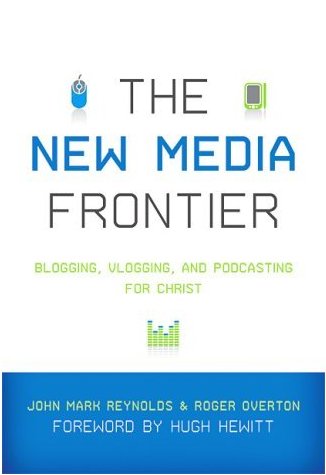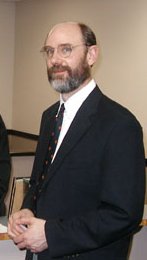 Professors are people with full-time jobs teaching students, researching subjects, and publishing their findings. Why would they add to this schedule something that is not a part of their job description: blogging?
Professors are people with full-time jobs teaching students, researching subjects, and publishing their findings. Why would they add to this schedule something that is not a part of their job description: blogging?
The question is not merely, ahem, academic. There are plenty of professors who have been blogging for as long as there have been blogs. And they have a lot of different strategies for maintaining a regularly-updated presence on the web, with lots of different goals and projects. But do they share a reason for blogging? What do they want from this work?
I tried to answer this question in the chapter I contributed to the new Crossway book The New Media Frontier: Blogging, Vlogging, and Podcasting for Christ.
It’s easy enough to find horror stories of professors “fired for blogging” (just google the phrase), or job applicants who suspect their strong online opinions have rendered them less than hireable. But what I wanted was evidence that somebody had been hired for blogging, or promoted for it, or that professors were using new media activity to make progress on their professorial goals. Instead of just brainstorming about my own reasons, I interviewed a handful of my favorite academic bloggers in my own field, Bible and theology. Here are some of the most helpful remarks from Michael Bird, Scot McKnight, Andreas Köstenberger, and Peter Leithart. Some of these quotes you’ll find in the book, some didn’t make it through the final edit and are appearing for the first and only time in this post.

New Testament scholar Michael Bird, who blogs at euangelion and also at evangelical textual criticism, had some good remarks about how he thinks of his online work as counting toward his overall academic goals, and enthusiastic testimony about the opportunities it has afforded him:

I’ve included on my CV my contribution to the “Evangelical Textual Criticism” website because it is part of my academic activity in that it contributes to scholarship and is read by many leading scholars, authors, and post-grad students. I consider it a legitimate and noteworthy activity in terms of academic practice, but I am cognizant of (a) not everyone knows what a blog is yet (still), and (b) some have a distaste for them too. Also, I do not include my own blog “Euangelion” on my CV because it is a mixture of journaling, biblical studies experimentation, networking, and shameless self-promotion.
My blog has put me on the radar of several publishers and editors who have noticed my blog, liked what they read, and asked to meet with me and discuss possible projects that cohere with their publishing goals (which is currently bearing great fruit!). More obliquely, through blogging I’ve established several friendships and partnerships with other junior scholars like myself whom I have successfully roped in to various publication projects that I am undertaking. In this sense, starting a blog has been one of the best things I’ve ever done.
In terms of marketing for seminaries and colleges is a brilliant tool. A fair few people who have either applied or inquired about post-graduate study at my college have done so on the basis that they want to do a Ph.D with me given what they have seen me do on my blog. So blogging I think is a great way of attracting research students if you can establish a niche of some kind that draws in people to the kind of stuff that you’re interested in.

When it comes to academic blogging, Scot McKnight is less of a case study and more of a force of nature: he produces carefully argued books in his field of expertise (New Testament), and also blogs very prolifically. Furthermore, his blog Jesus Creed has the comments feature enabled, and he encourages his readers to interact directly with him through those comments. McKnight offers the following reflections on how his life online and offline are all one thing:

Blogging has created a new “community” (virtual) for me. It is impossible for me to know who this audience is, even if I routinely meet people who say they read my blog regularly. We get about 5-6000 hits a day with about 3000-3500 unique visitors, and appr 30,000 unique visitors per month. About 2% of my readers offer comments. But, we’re assuming this is a congregation of academics, pastors and lay folks who gather daily around the blog. I blog in order to speak to and interact with the church at large.
I have received numerous invitations — to speak and to write — because of the blog. None of them have had anything to do with academic work. When I speak at other schools, though, many professors tell me they read the blog.
I guess the “academic” vs. “whatever” is something I don’t think about that way. I don’t have academic goals vs. other goals; I just have goals — to live out and articulate the gospel in our day in our way whenever and wherever I can. So, blogging is an element of what I do.
Blogging makes academics more accountable to the church and to the opinion of the average person who can simply jot down his or her ideas without any credentials whatsoever.

NT Scholar Andreas Köstenberger maintains a helpful resource blog with a clear emphasis: to make as much of his writing easily available online as possible. Biblical Foundations is the name of his site. Köstenberger gave some quick responses to the following questions:

Have you been promoted or published as a result of your online work? Are you trying to reach a new audience, or to serve your old audience better?
I did receive one book contract as a result and some speaking engagements and radio and newspaper interviews. Also, I find it allows for mentoring of seminary students at other schools.
What impact will new media have on academic work?
I think the scene is forever changed. There is a network that spans globally across the spectrum. Scholarship is made more accessible and disseminated beyond traditional forms of communication and publication. This is why I blog.
My primary goal is to disseminate some of my scholarship in a format that reaches a wider audience: by presenting a digest of my scholarly work; by simplifying it; by excerpting it and directing people to my full research in form of books, periodical articles, etc.

Theologian Peter Leithart has developed a unique blogging style: high-volume, short posts that let you know exactly what he’s working on during any given day. Whether it’s his classes, an upcoming book project, the next homily at his church, or just general reading, Leithart posts a steady stream of thoughts at leithart.com.

I don’t have a worked-out theory of what I’m aiming for on my blog…
Blogging speeds up exchanges of ideas in the academy. Bloggers can go public with hypotheses that would not pass a peer review process but which might be valuable. And, the hypothesis can be critiqued, revised, qualified, and so on very rapidly. The time lag between submission to a journal, or submission of a book ms, to publication is still very long, despite advances in technology; but blogging speeds up the process.
Second, blogging gives an instant international audience. I learned recently that next to the US the country that has the most hits on my site is Poland.
I know a few Poles, but only a few. That’s an audience I don’t have for my printed work.Third, along the same lines, blogging allows non-academics to have access to ideas and theories that would be hidden from most of them.
The Poles I know can’t afford theological journals, but can read my summaries of articles on my blog.